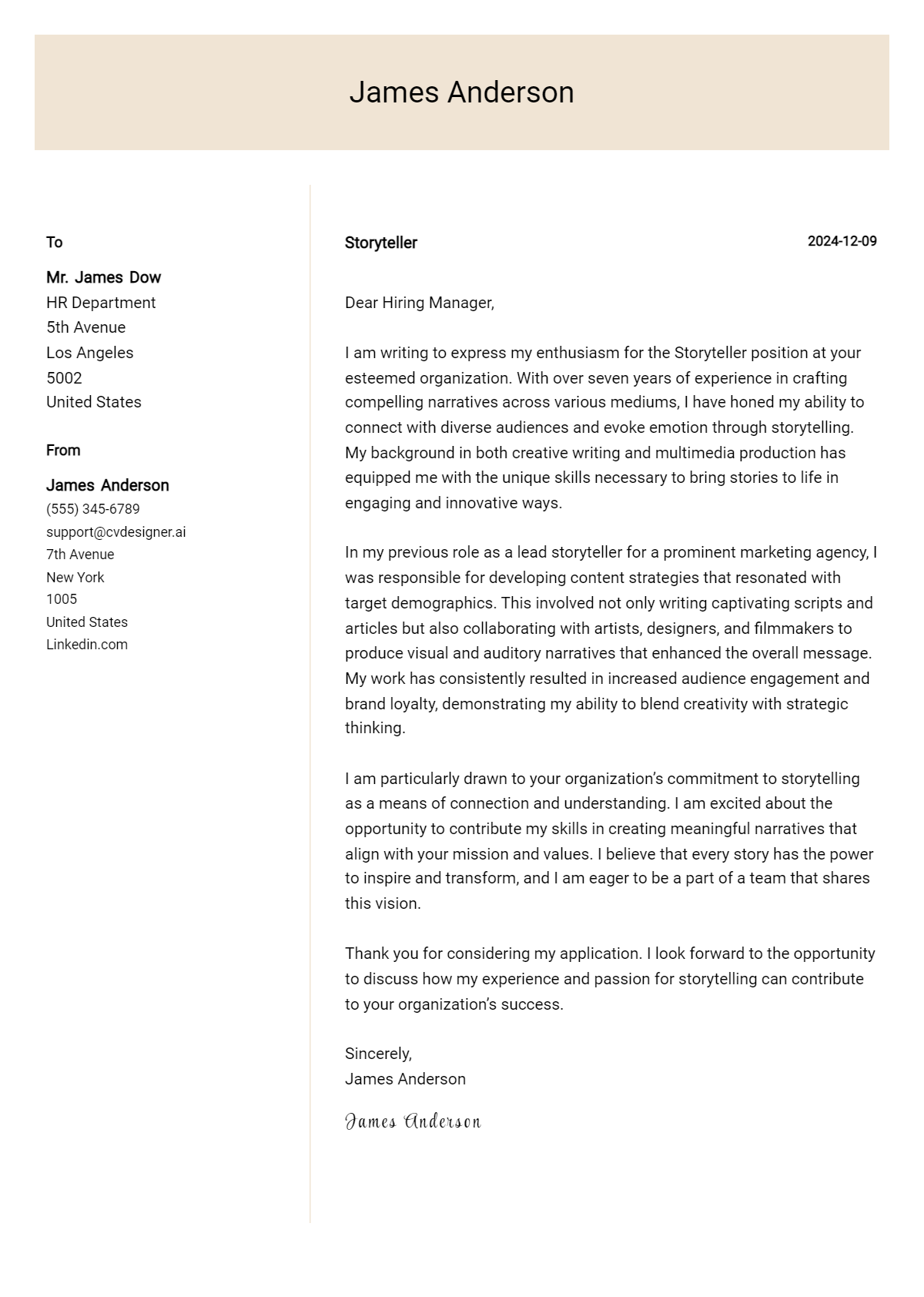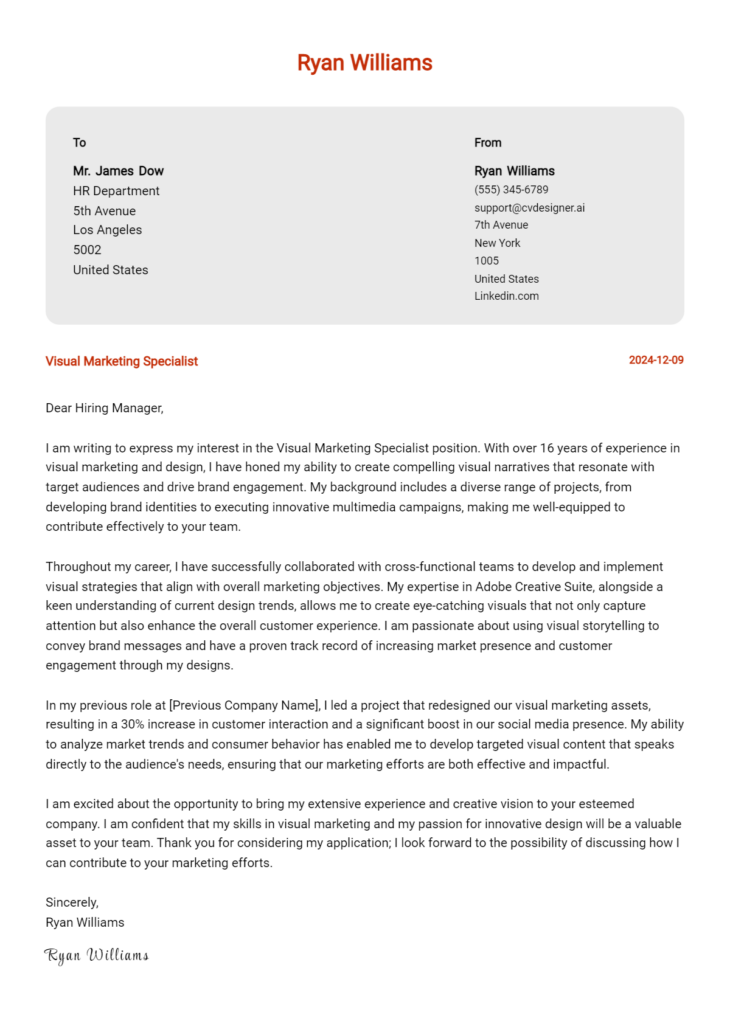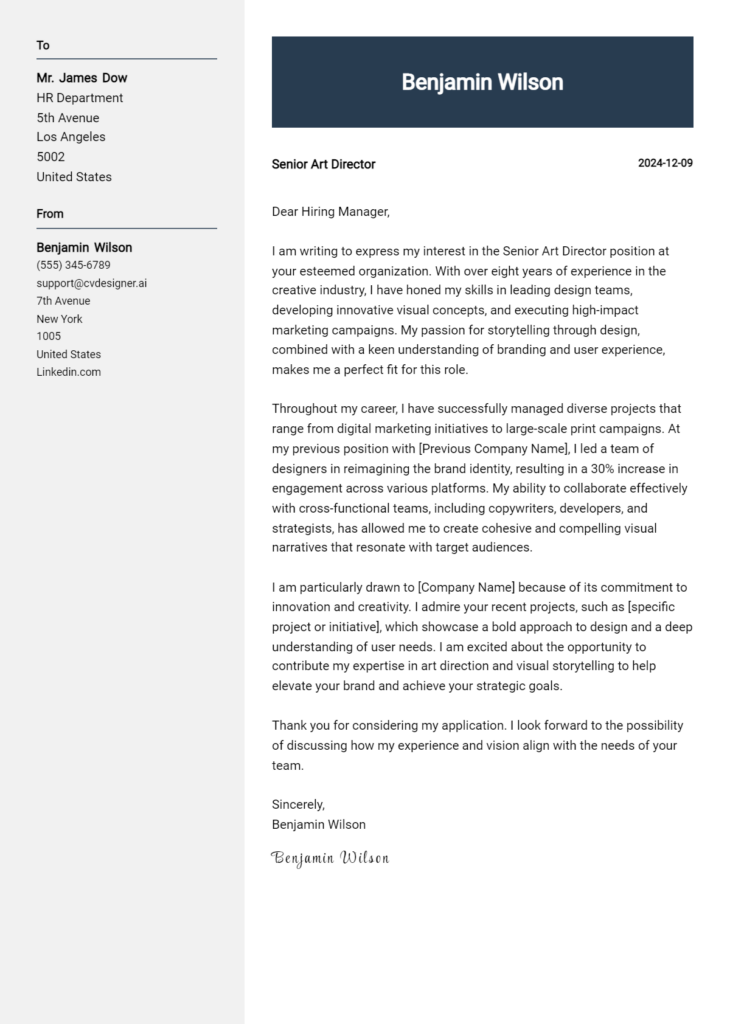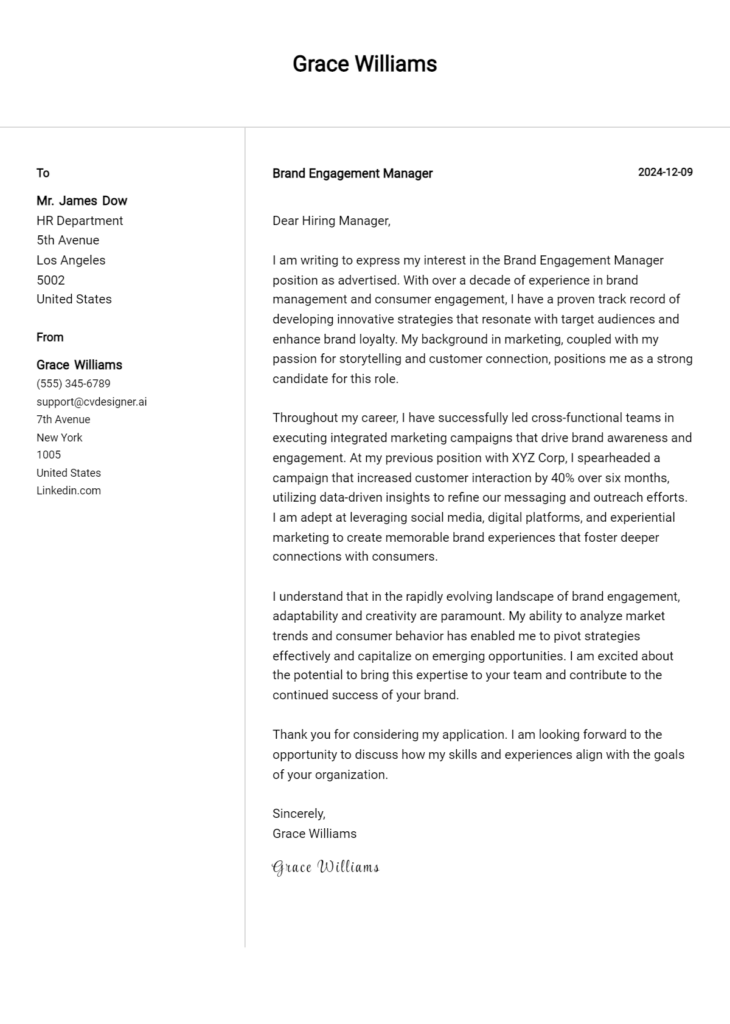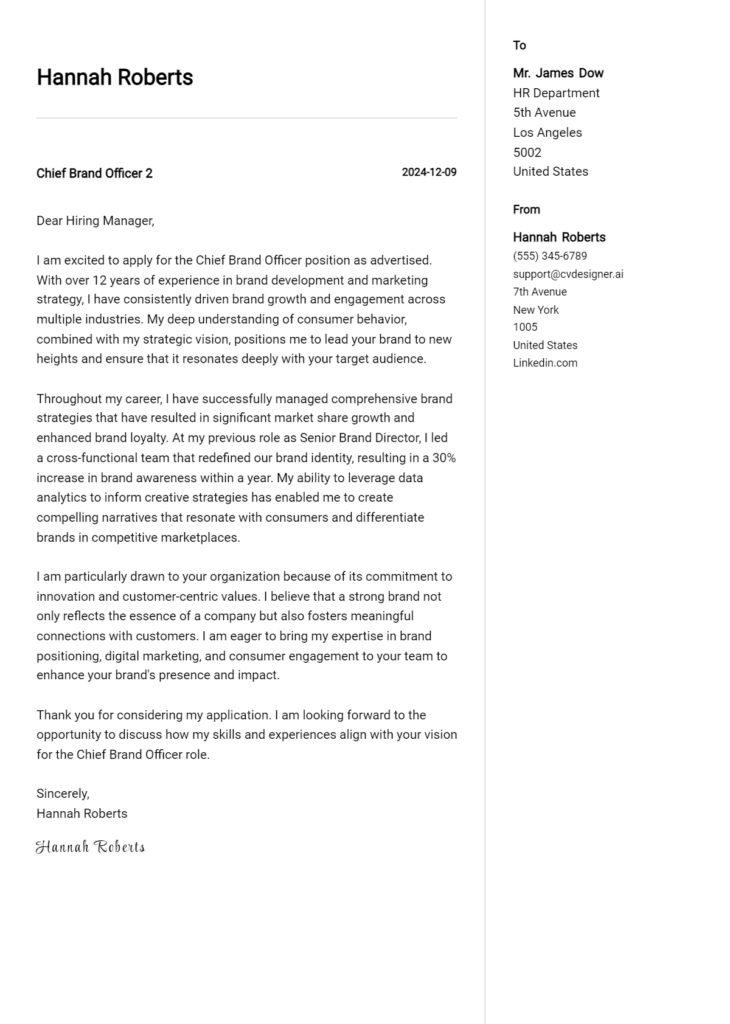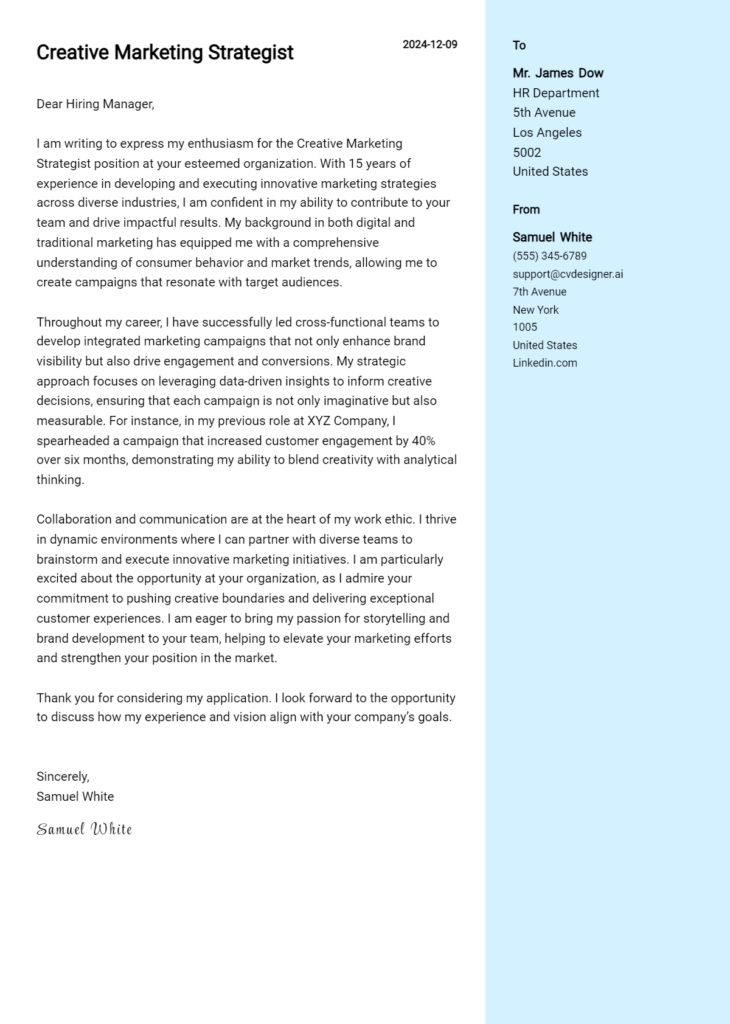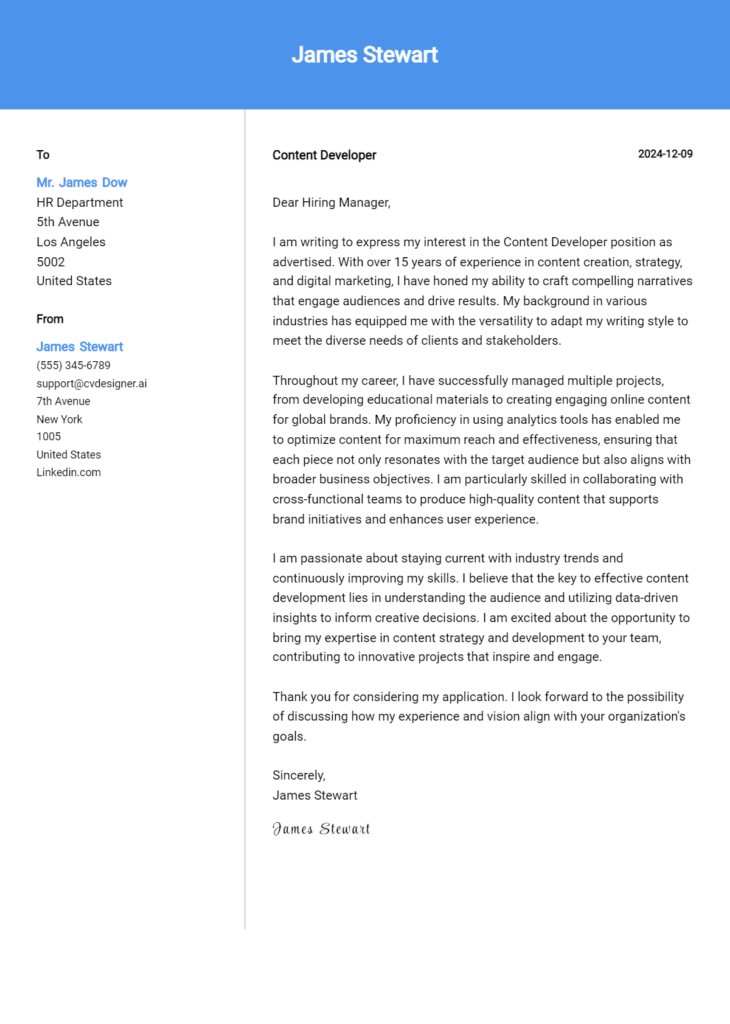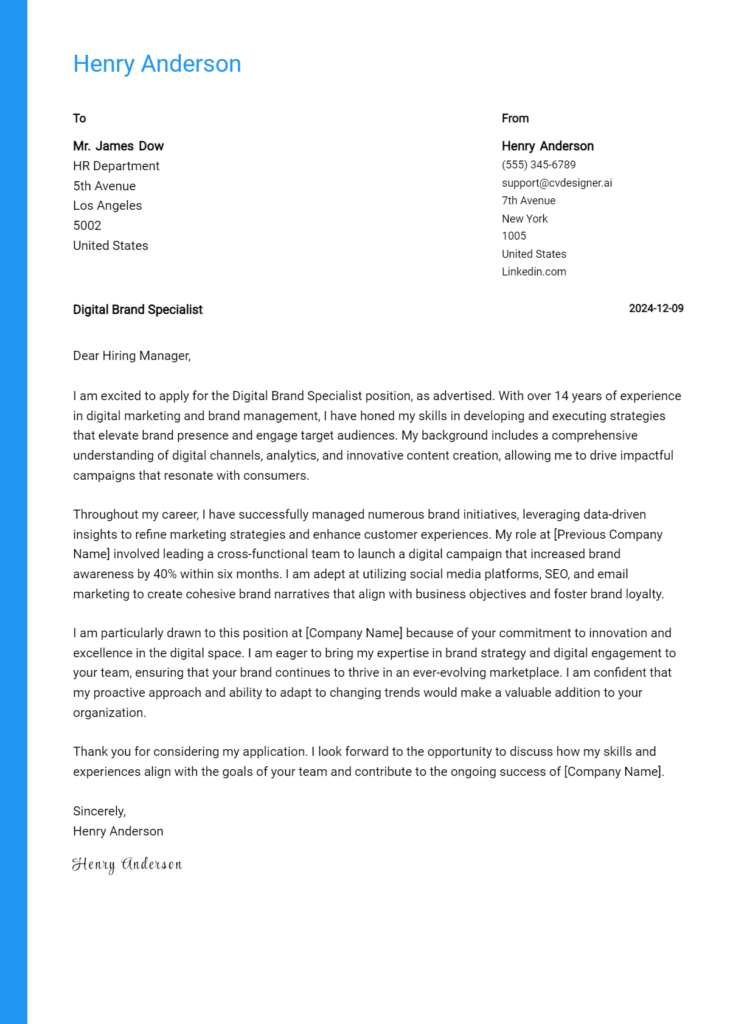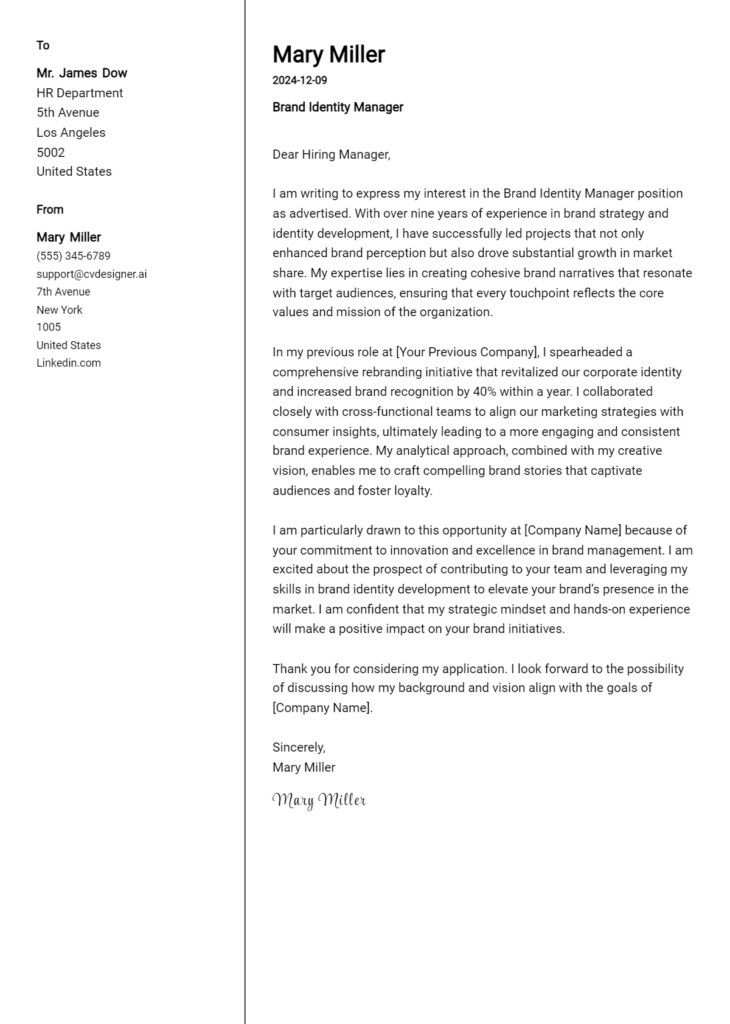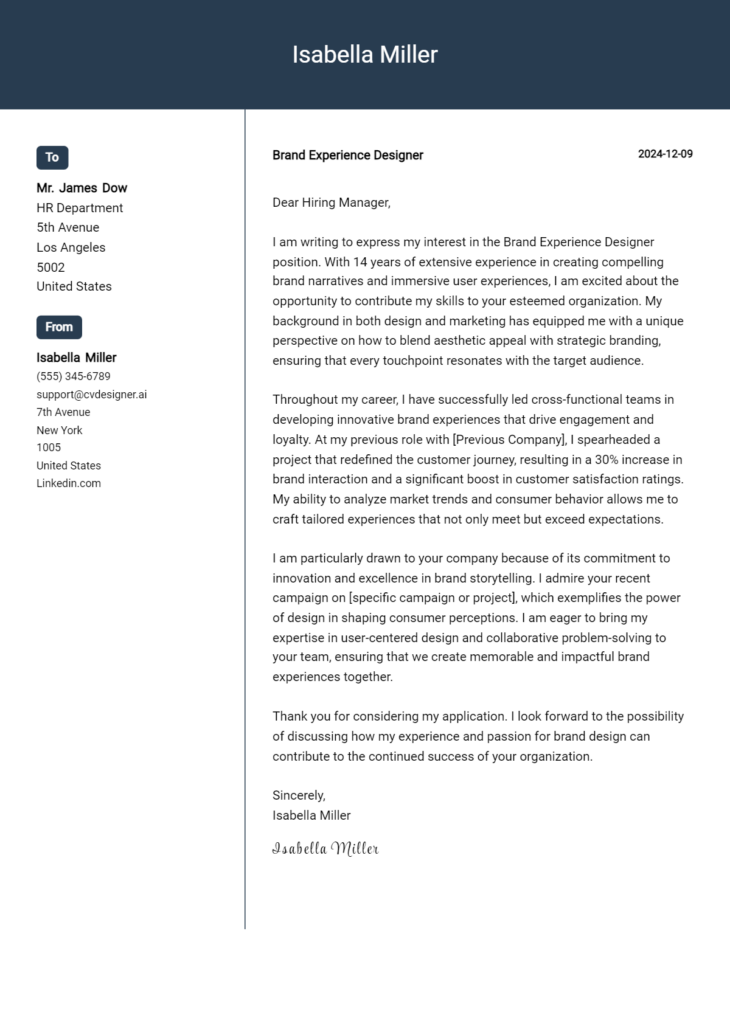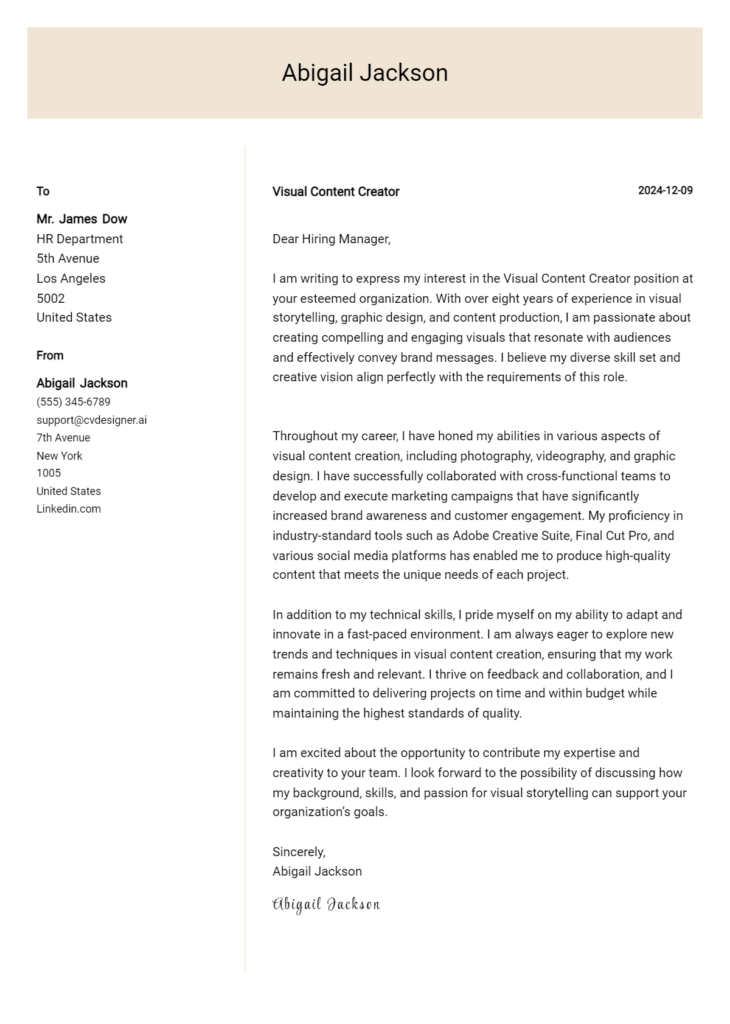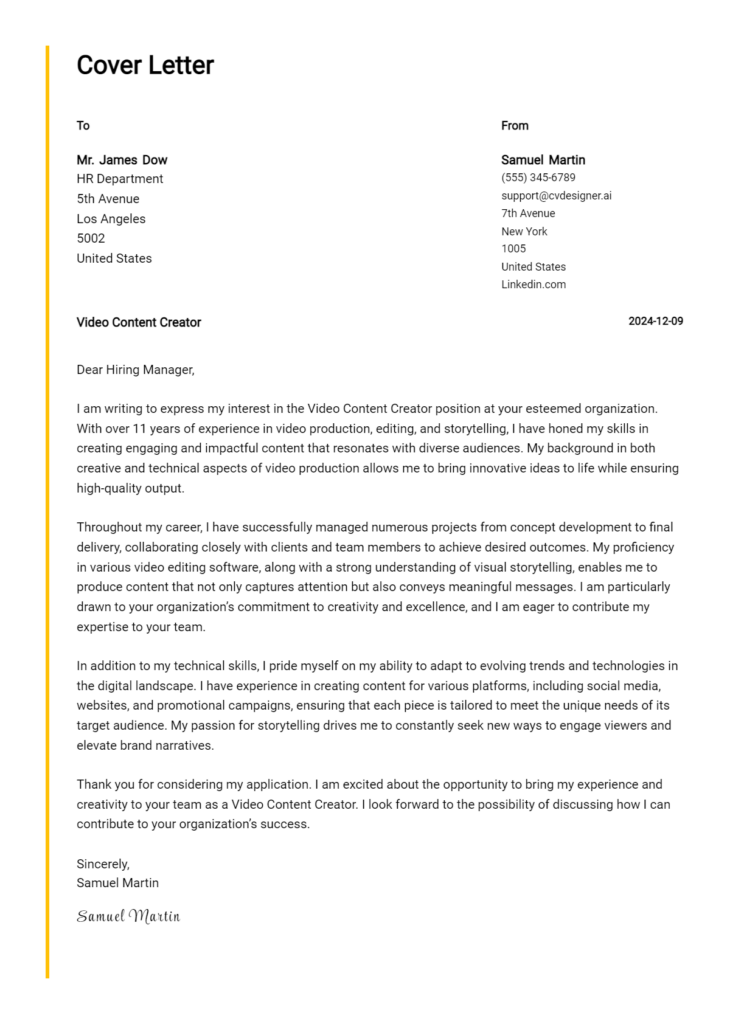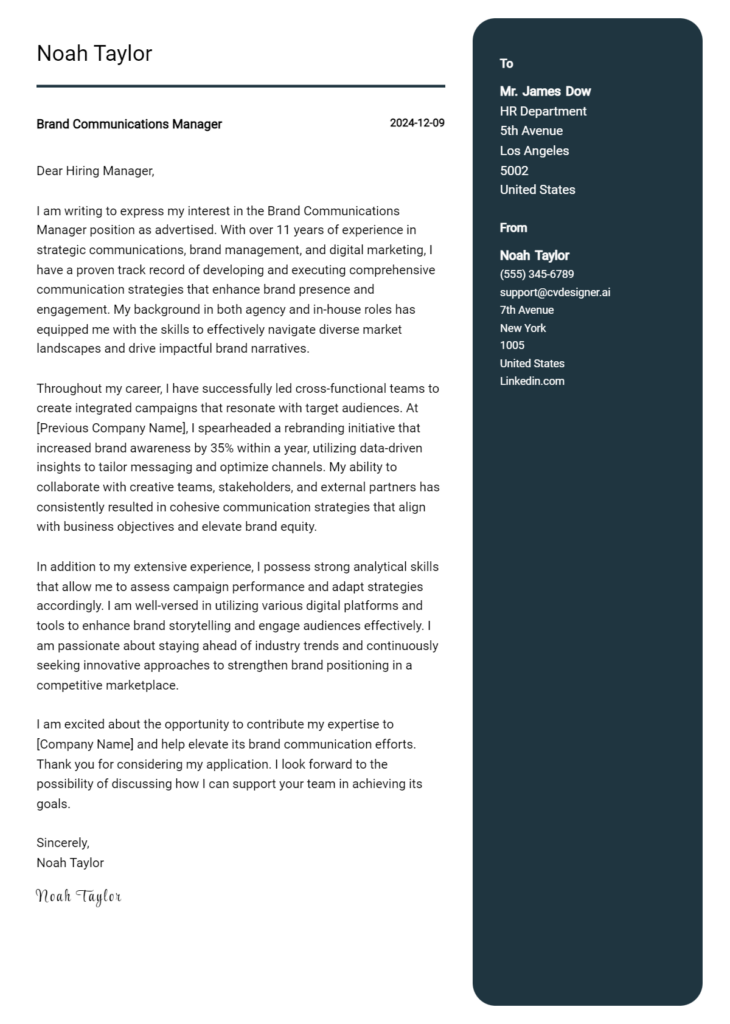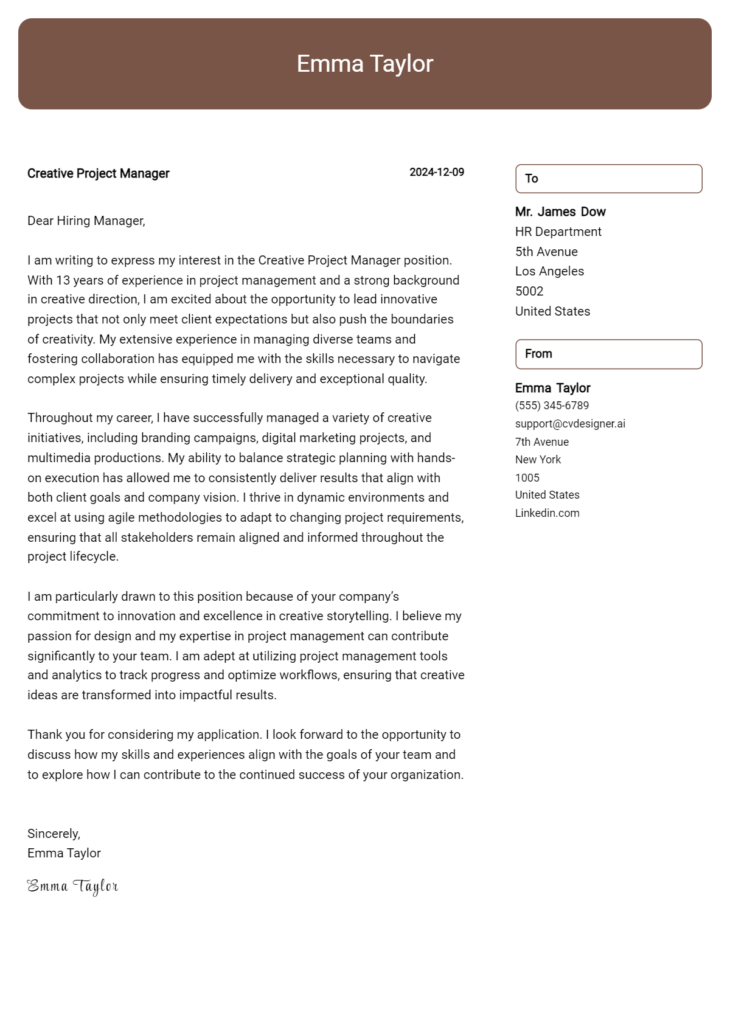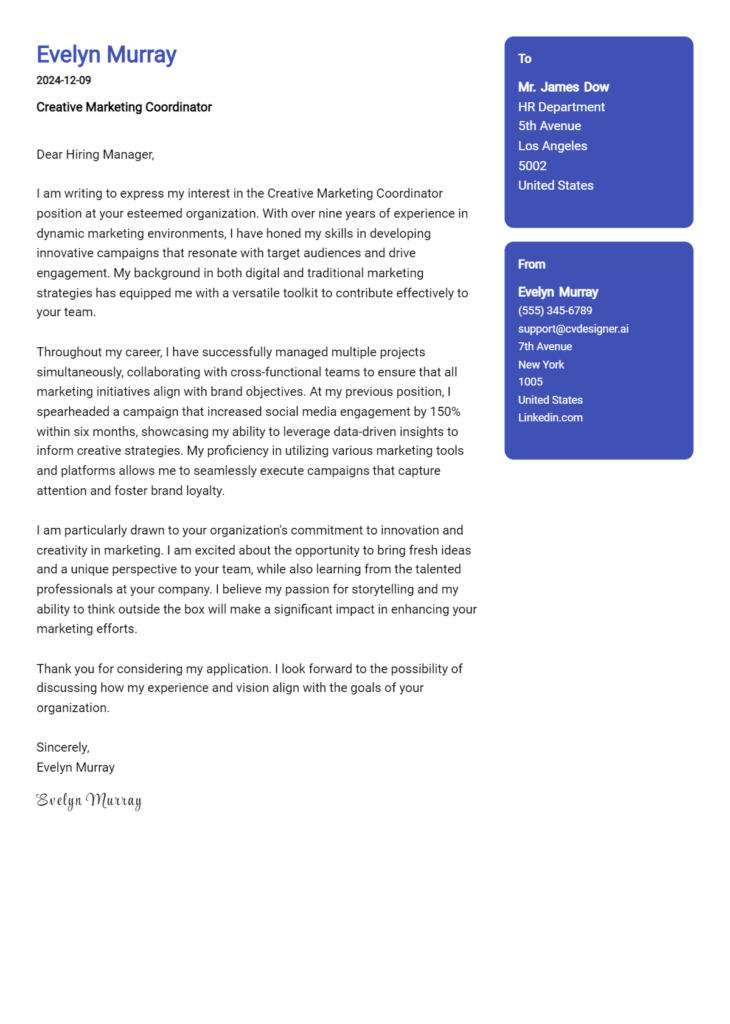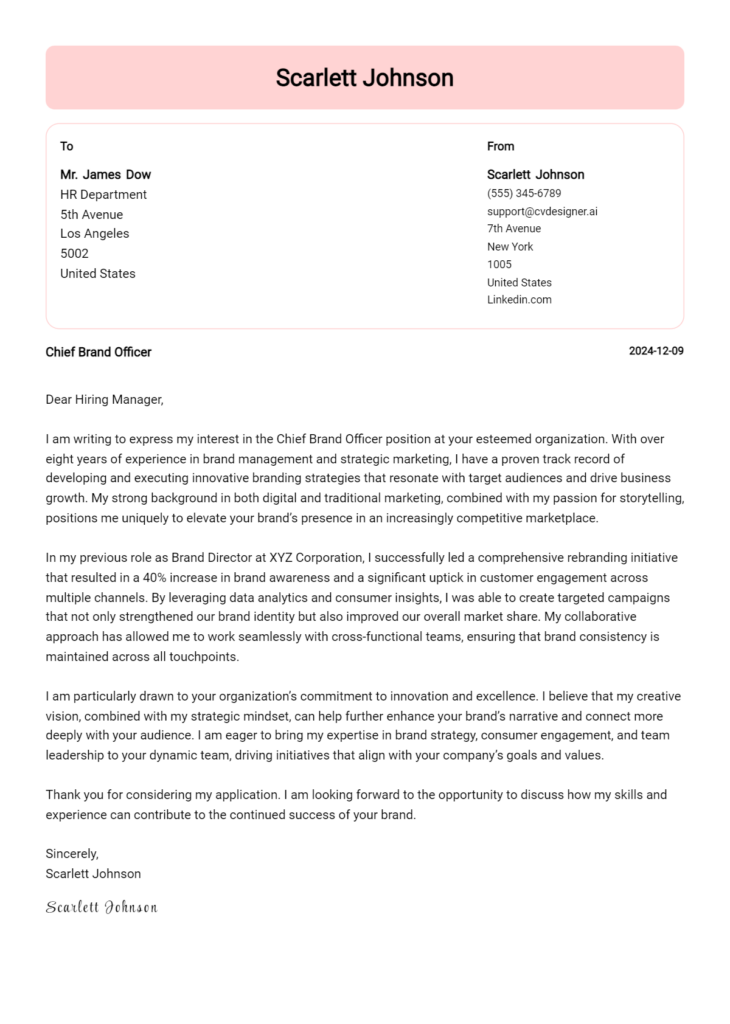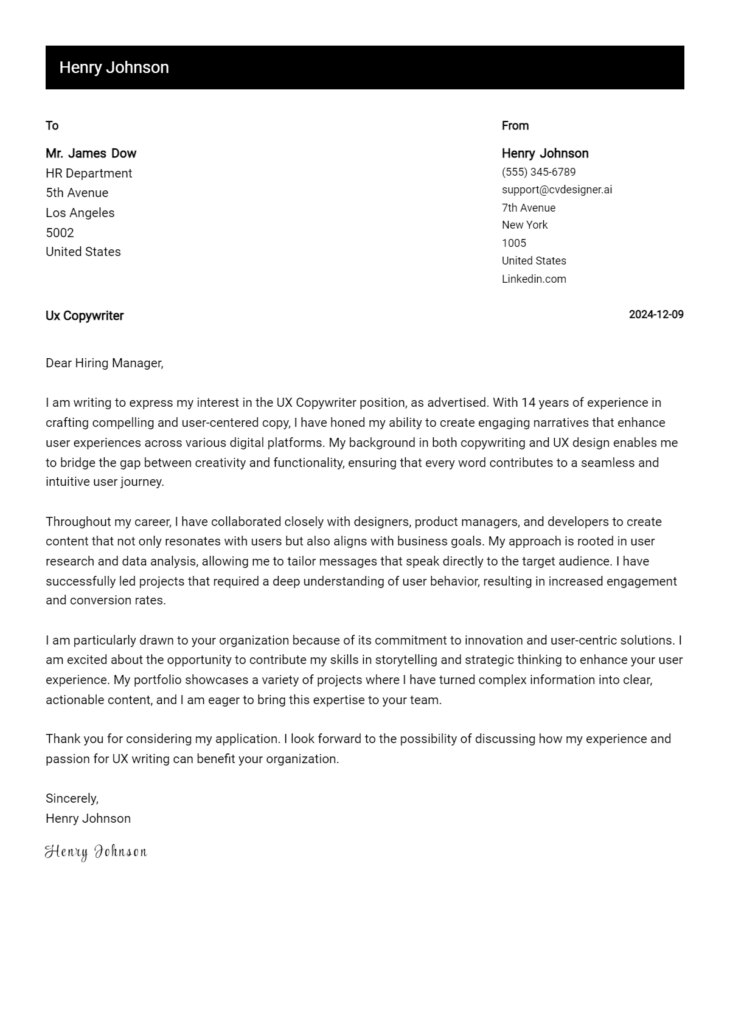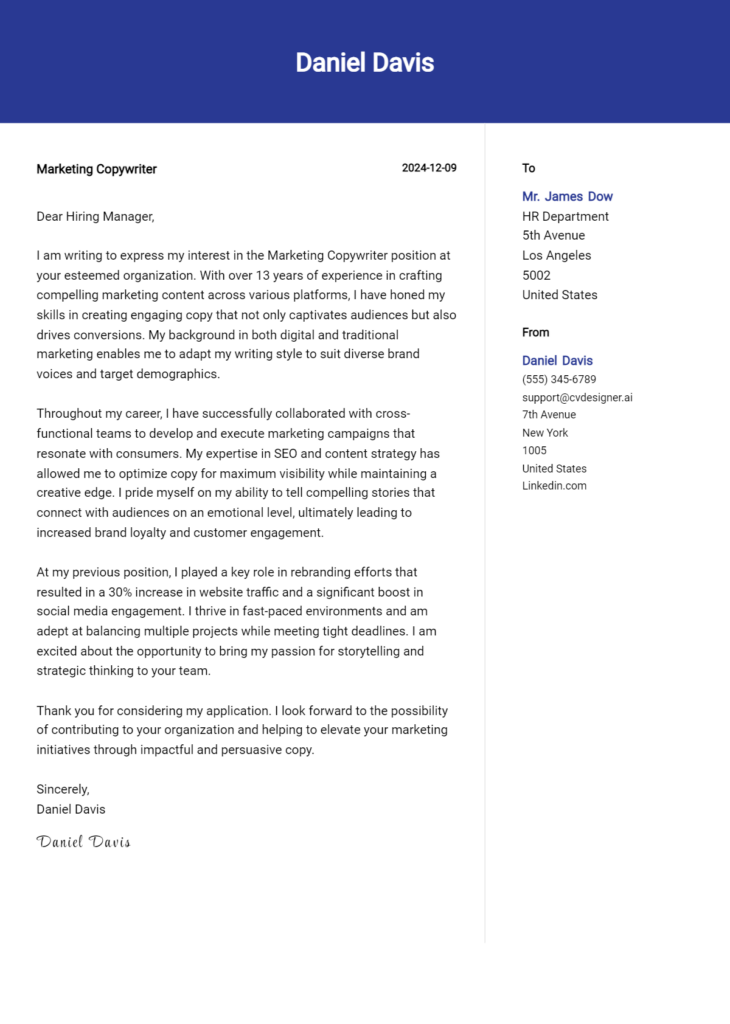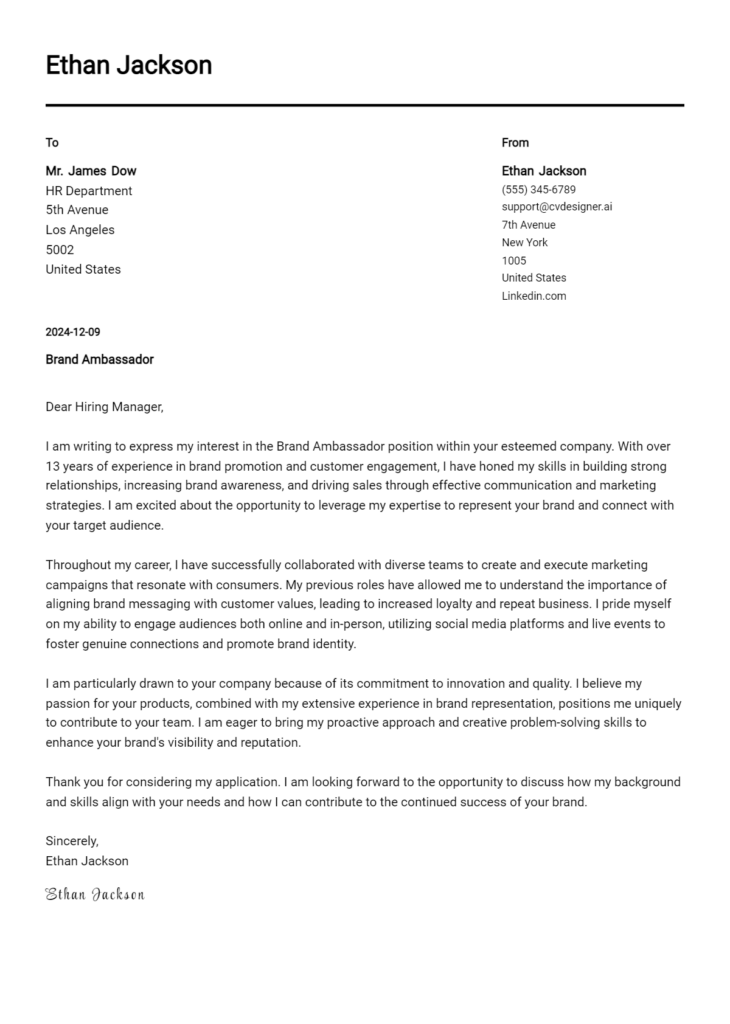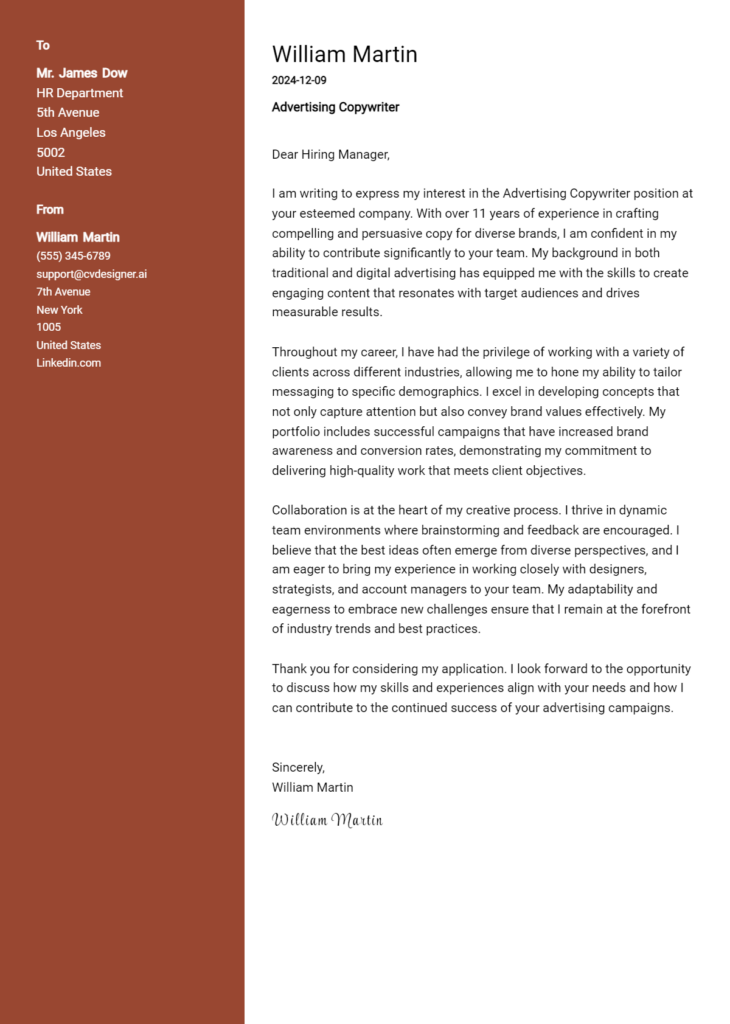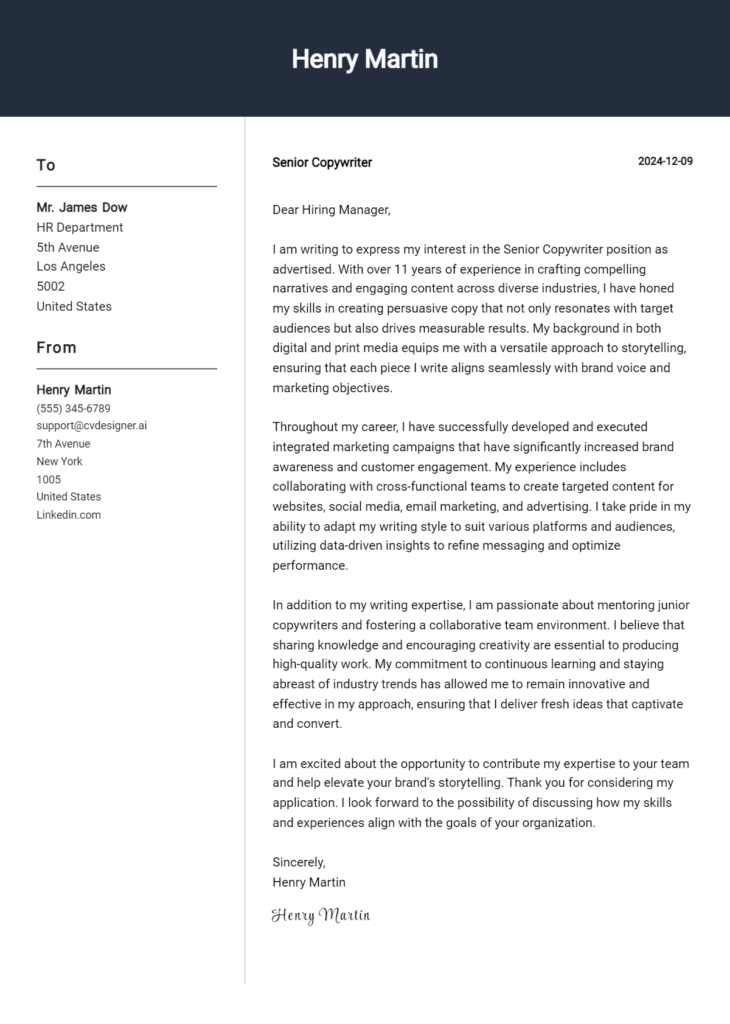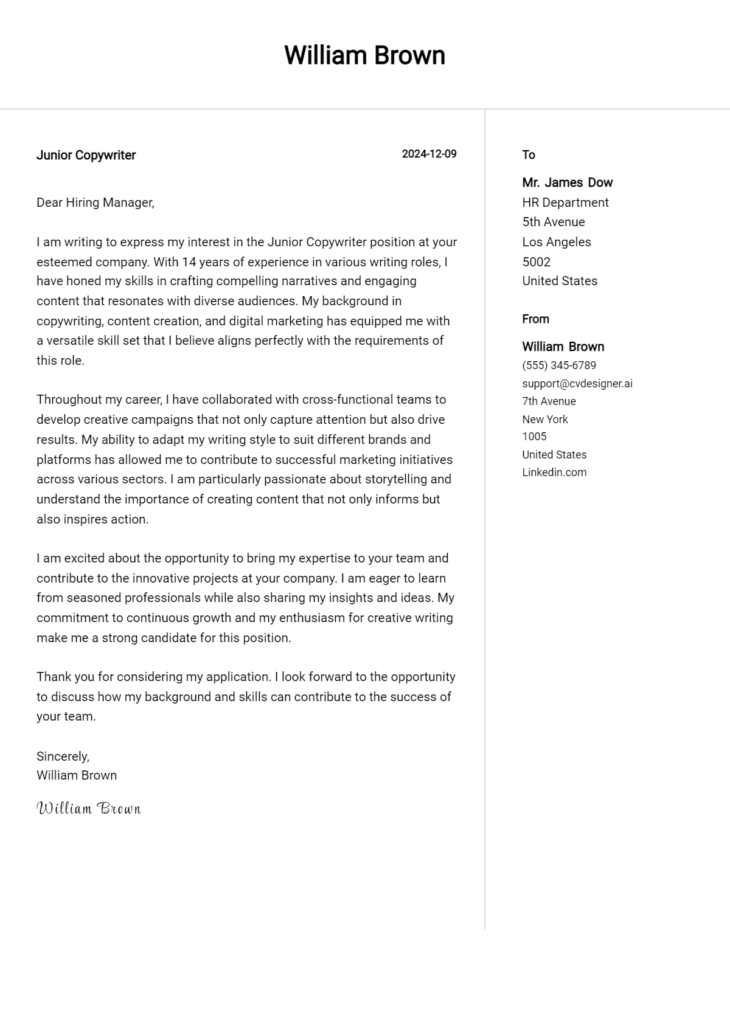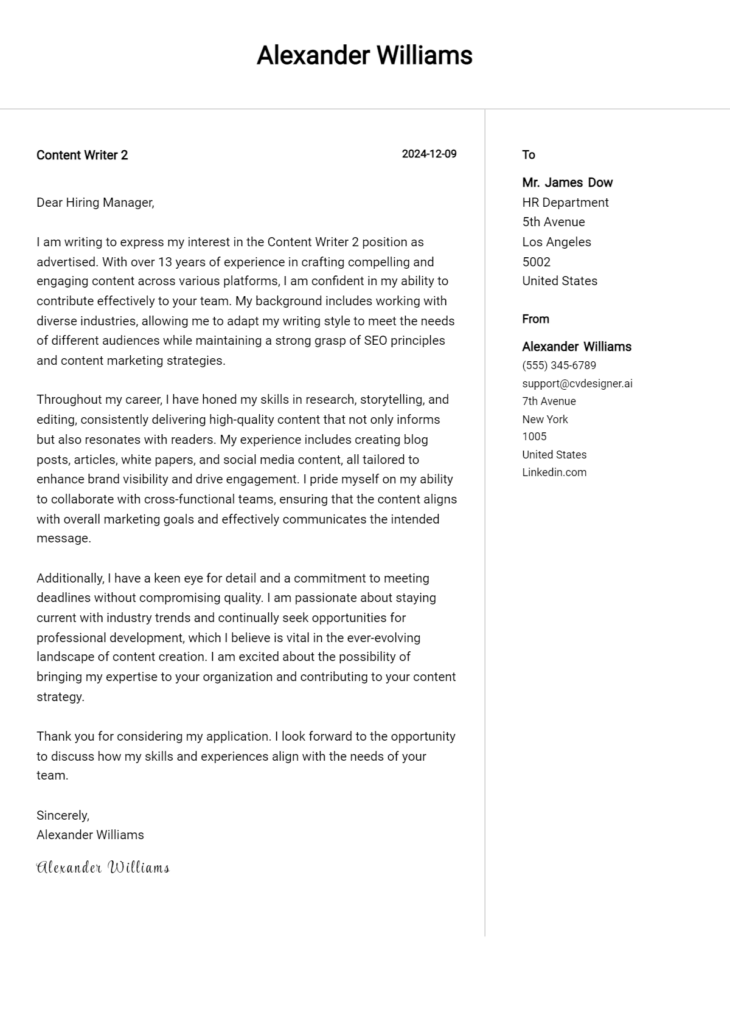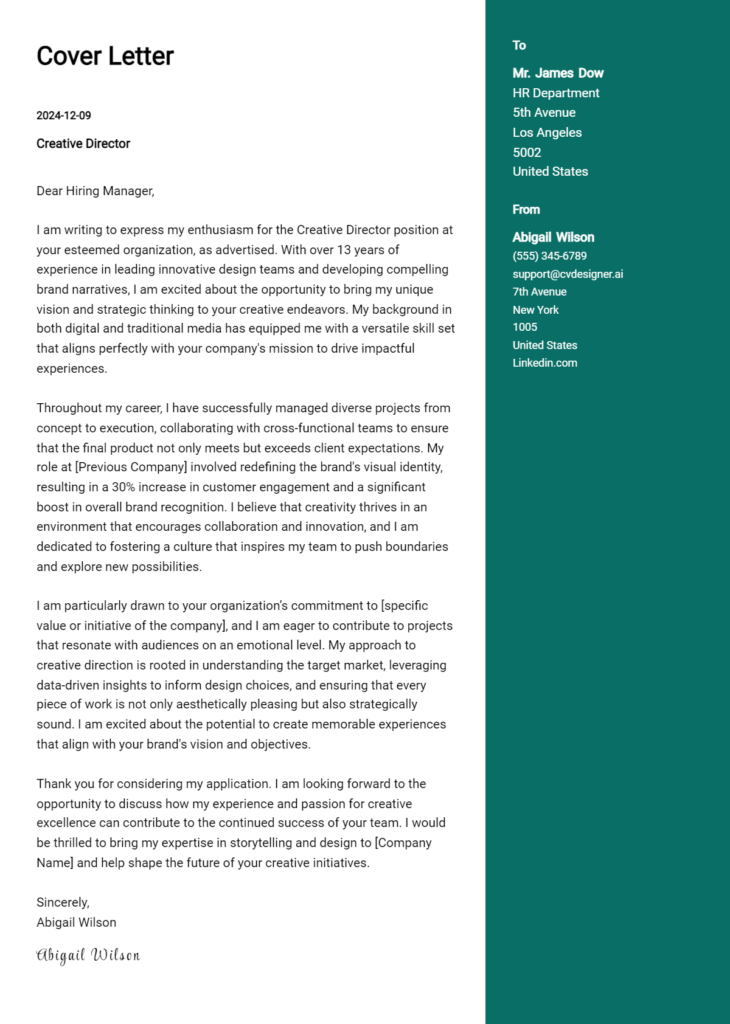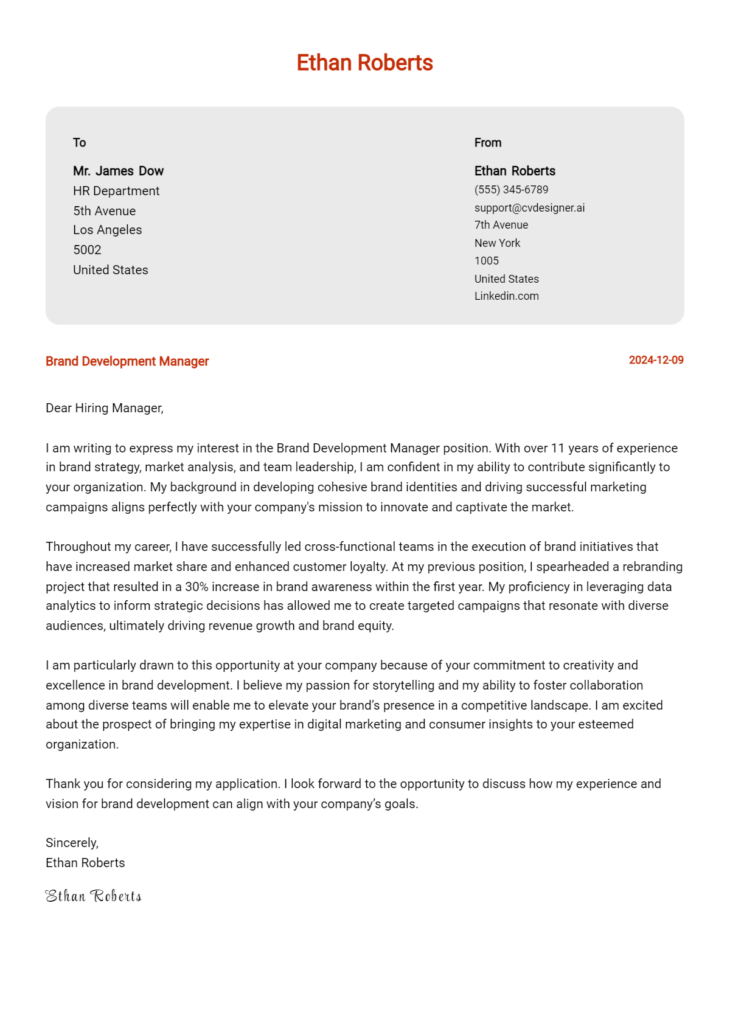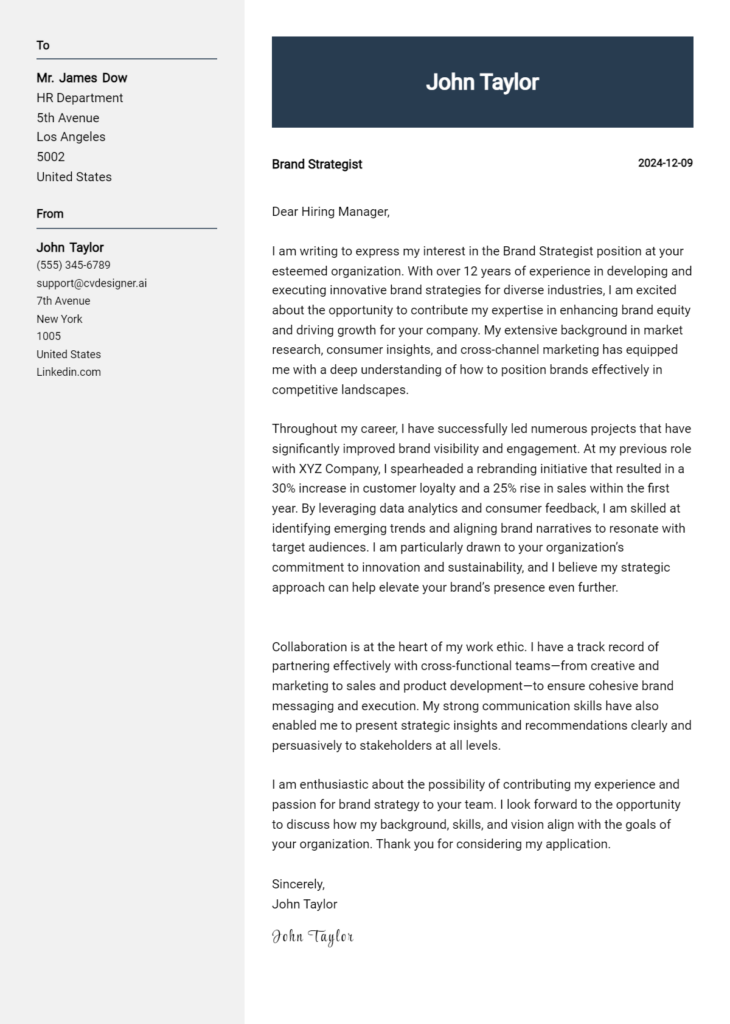Storyteller Cover Letter Examples
Explore additional Storyteller cover letter samples and guides and see what works for your level of experience or role.
How to Format a Storyteller Cover Letter?
Crafting a captivating cover letter is essential for a storyteller, as it serves as your first chance to engage your audience—the hiring manager. The way you present your narrative skills and experiences not only showcases your creativity but also reflects your ability to communicate effectively. A well-structured cover letter not only grabs attention but also allows you to weave a compelling story about your qualifications, making it an indispensable tool in your application process.
In this guide, we’ll explore how to structure your storyteller cover letter, providing insights and examples tailored to the storytelling profession.
We’ll focus on the essential components of a professional cover letter, including:
- Cover Letter Header
- Cover Letter Greeting
- Cover Letter Introduction
- Cover Letter Body
- Cover Letter Closing
Each section plays a crucial role in highlighting your storytelling abilities and professionalism. Let’s delve into each part and discover how to make your storyteller cover letter resonate.
The Importance of a Cover Letter Header for a Storyteller
A well-crafted cover letter header is essential for a Storyteller, as it sets the tone for the entire application and provides crucial information at a glance. Clarity and professionalism are key; the header should include your contact information, the date, and the recipient's details. This not only makes it easy for employers to reach you but also demonstrates your attention to detail and respect for the hiring process. A strong header can make a positive impression, while a weak one can detract from your credibility and the quality of your storytelling.
Strong Example:
Jane Doe 123 Story Lane Imagination City, ST 12345 jane.doe@email.com (123) 456-7890 October 1, 2023 Mr. John Smith Hiring Manager Creative Writing Agency 456 Talent Avenue Inspiration Town, ST 67890
Weak Example:
J.D. Unknown Address No City, ST email@example.com Today To Whom It May Concern
The Importance of the Cover Letter Greeting
The greeting of your cover letter serves as the initial touchpoint between you and the hiring manager, setting the tone for the rest of your application. A well-crafted greeting not only demonstrates professionalism but also conveys a sense of personalization that can make your application stand out. By addressing the hiring manager directly, you show that you’ve taken the time to research and understand the company’s culture, which reflects your genuine interest in the role. Avoiding generic greetings is crucial; instead, strive to find the recipient's name through LinkedIn, the company website, or networking. This small yet significant detail can elevate your cover letter from a standard submission to a memorable introduction.
Strong Greeting Example
Dear Ms. Johnson,
Weak Greeting Example
To Whom It May Concern,
The Importance of a Compelling Cover Letter Introduction for a Storyteller
A well-crafted cover letter introduction is crucial for a Storyteller, as it serves as the first impression to the hiring manager. This opening paragraph not only needs to capture attention but also convey genuine interest in the role. It should provide a snapshot of the candidate's key skills or notable achievements, setting the tone for the rest of the application. A strong introduction can entice the reader to continue, while a weak one may fail to leave a lasting impact. Here are examples to illustrate the difference:
Strong Example:
Dear [Hiring Manager's Name], As a passionate storyteller with over five years of experience crafting compelling narratives for diverse audiences, I was thrilled to discover the opening for the Storyteller position at [Company Name]. My background in creative writing and my ability to weave intricate plots have allowed me to engage audiences in unique ways, such as my recent project where I increased reader engagement by 40% through immersive storytelling. I am excited about the opportunity to bring my creativity and expertise to your dynamic team.
Weak Example:
Hello, I am writing to apply for the Storyteller job. I think storytelling is interesting and I have done some writing in the past. I hope you will consider my application.
Purpose of the Cover Letter Body for a Storyteller
The cover letter body for a Storyteller serves as a vital platform for candidates to articulate their unique narrative skills, professional experiences, and the specific value they can bring to a prospective employer. It allows candidates to detail their storytelling techniques, highlight relevant projects, and discuss their impact within previous roles. By sharing compelling anecdotes and accomplishments, storytellers can demonstrate how their creativity and expertise align with the company’s vision and goals. A well-crafted cover letter body not only showcases the candidate's talent but also connects their personal storytelling style to the needs of the organization.
Strong Example
Dear Hiring Manager, As a passionate storyteller with over five years of experience in content creation and narrative development, I am excited to apply for the Storyteller position at [Company Name]. In my previous role at [Previous Company Name], I successfully led a project that involved crafting a series of engaging multimedia stories aimed at increasing audience engagement by 40%. One of my proudest achievements was the "Voices of the Community" series, where I interviewed local residents and shared their unique experiences, resulting in a 25% increase in our social media following. I believe my ability to weave authentic narratives that resonate with diverse audiences will be a valuable asset to your team. Sincerely, [Your Name]
Weak Example
Dear Hiring Manager, I am interested in the Storyteller position at [Company Name]. I have done some storytelling in the past and I think I could be good at it. I worked on a few projects that involved writing stories, but I can't remember all the details. I really like stories and would love to work for your company. Best, [Your Name]
Importance of the Cover Letter Closing for a Storyteller
The closing paragraph of a cover letter is crucial for a storyteller as it serves to summarize qualifications, reiterate interest in the position, and encourage the next steps in the hiring process. A strong closing can leave a lasting impression, motivating the reader to delve into the resume and consider scheduling an interview. Conversely, a weak closing might fail to convey enthusiasm or professionalism, potentially diminishing the candidate's chances of moving forward.
Strong Example
Thank you for considering my application. With my extensive background in narrative development and my passion for crafting engaging stories, I am excited about the opportunity to contribute to your team. I believe my skills align perfectly with your needs, and I look forward to discussing how I can bring unique storytelling perspectives to your projects. Please feel free to review my resume, and I hope to schedule an interview soon to explore this opportunity further.
Weak Example
Thanks for reading my letter. I think I’d be okay for the job since I like stories. You can look at my resume if you want. Let me know if you want to talk or something.
Crafting an effective cover letter for a Storyteller position is crucial in making a strong first impression on potential employers. A well-written cover letter not only highlights your creative abilities but also showcases your technical skills, problem-solving capabilities, and knowledge of the Software Development Life Cycle (SDLC). Additionally, emphasizing your experience with teamwork and your passion for continuous learning can set you apart from other candidates. Here are some tips to help you create a compelling cover letter that resonates with hiring managers.
Tips for Writing a Cover Letter for a Storyteller
Showcase Your Technical Skills
As a Storyteller, it’s essential to demonstrate your proficiency in relevant tools and technologies. Mention specific software, programming languages, or platforms you are skilled in that can enhance your storytelling capabilities. Use examples from previous projects to illustrate how these skills contributed to successful outcomes.Highlight Problem-Solving Abilities
Storytelling often involves overcoming challenges, whether in narrative development or audience engagement. Discuss a situation where you identified a problem and devised a creative solution. This not only emphasizes your analytical skills but also your ability to think on your feet, which is crucial in a fast-paced storytelling environment.Demonstrate Knowledge of SDLC
Understanding the Software Development Life Cycle can be advantageous, especially if your storytelling involves interactive or digital mediums. Briefly explain how your knowledge of SDLC has informed your storytelling process, such as how you’ve adapted narratives to fit different stages of development or technology integration.Emphasize Teamwork and Collaboration
Storytelling is rarely a solo endeavor; it often requires collaboration with writers, designers, and developers. Share experiences where you worked effectively within a team, highlighting your role and contributions. This shows potential employers that you are a team player who values collective creativity.Convey a Passion for Continuous Learning
The field of storytelling is ever-evolving, making continuous learning vital. Mention any recent courses, workshops, or self-directed learning initiatives you’ve undertaken to enhance your skills and knowledge. This not only reflects your commitment to personal growth but also your adaptability in a dynamic industry.
By integrating these tips into your cover letter, you can effectively showcase your qualifications and passion for the Storyteller role. For further assistance, consider utilizing cover letter templates or a cover letter builder to streamline your writing process and ensure your letter stands out.
Common Mistakes to Avoid in a Storyteller Cover Letter
Crafting a compelling cover letter is essential for standing out as a storyteller, as it serves as your first opportunity to narrate your professional journey. However, many applicants fall into common traps that can detract from their message. Here are some frequent mistakes to avoid when writing your cover letter:
Generic Salutations: Using a vague greeting like "To Whom It May Concern" can make your letter feel impersonal. Always try to address the hiring manager by name.
Lack of Specificity: Failing to tailor your cover letter to the specific role and company can make your application blend into the background. Highlight your relevant experiences and how they align with the company's mission.
Overly Formal Language: While professionalism is important, a storyteller's cover letter should reflect your unique voice. Strive for a conversational tone that showcases your personality.
Ignoring Formatting Guidelines: A cluttered or improperly formatted cover letter can be hard to read. Follow a clear cover letter format to ensure your letter is visually appealing and easy to navigate.
Repetition of Your Resume: Simply restating your resume doesn't add value. Use the cover letter to elaborate on your experiences and tell a story about your qualifications.
Neglecting Proofreading: Spelling and grammatical errors can undermine your professionalism. Always proofread your cover letter, or ask someone else to review it before submission.
Failing to Show Passion: A lack of enthusiasm for storytelling can be a red flag. Be sure to convey your passion for the craft and your eagerness to contribute to the company’s vision.
By avoiding these pitfalls, you can craft a compelling cover letter that effectively showcases your storytelling abilities. For inspiration, check out some cover letter examples that demonstrate best practices in action.
Cover Letter FAQs for Storyteller
What should I include in my cover letter as a Storyteller?
In your cover letter, emphasize your storytelling skills and experience. Start with a strong opening that captures the reader's attention, perhaps with a brief anecdote or a compelling statement about your passion for storytelling. Highlight specific projects or experiences that demonstrate your ability to create engaging narratives across different mediums, such as written stories, scripts, or oral presentations. Discuss your understanding of your target audience and how you tailor your storytelling to resonate with them. Finally, mention any relevant skills like research, creativity, and collaboration that enhance your storytelling abilities, and conclude by expressing your enthusiasm for the opportunity.
How can I demonstrate my storytelling style in my cover letter?
To showcase your storytelling style, consider incorporating a brief narrative or personal story into your cover letter. This could be an anecdote about how you discovered your passion for storytelling, a memorable project you worked on, or a challenge you overcame through your narrative skills. Use vivid language and descriptive details to reflect your unique voice and style. Additionally, you can reference specific genres or themes you enjoy exploring in your work and how they influence your storytelling approach. By weaving in your style, you not only engage the reader but also provide a glimpse into your creative process.
How important is it to tailor my cover letter for each application?
Tailoring your cover letter for each application is crucial, especially in a creative field like storytelling. A customized cover letter demonstrates your genuine interest in the position and shows that you've done your research on the company or organization. Reference specific projects or values of the company that resonate with you, and explain how your storytelling skills align with their goals. This personalized approach helps you stand out among other applicants and allows you to convey how your unique voice and experiences make you a perfect fit for the role. Always make the effort to connect your narrative style to the needs of the employer.
Should I include examples of my work in my cover letter?
While your cover letter should highlight your storytelling abilities and experiences, including specific examples of your work can make your application more compelling. You can mention notable projects, publications, or performances that showcase your skills, but avoid attaching full pieces unless specifically requested. Instead, include links to your portfolio, website, or social media where your work can be viewed. This allows potential employers to easily access your storytelling samples and engage with your style. Ensure that the examples you choose are relevant to the job you're applying for, illustrating how your previous work aligns with the role's requirements.
Build your Cover Letter in minutes
Use an AI-powered cover letter builder and have your letter done in 5 minutes. Just select your template and our software will guide you through the process.

